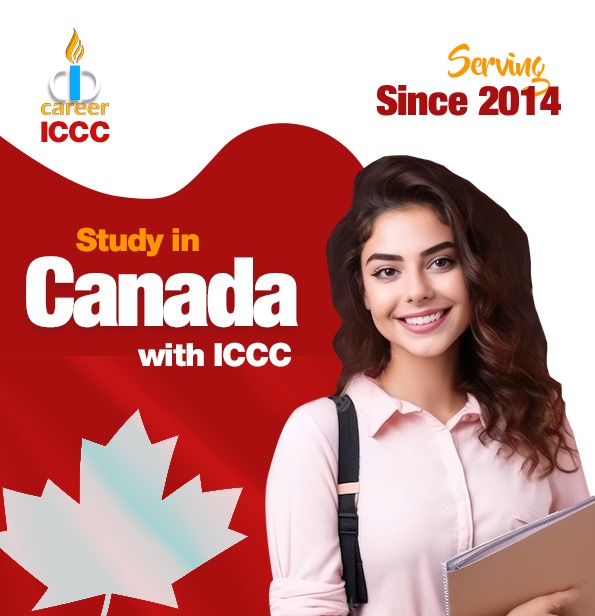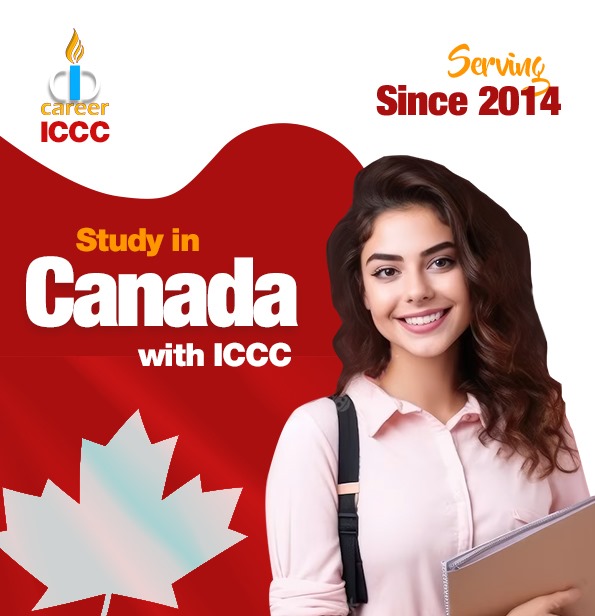6 Convincing Arguments that will make you want to Study in Canada in 2024
Are you a Nepalese student with aspirations of pursuing higher education overseas? Canada, known as the Great White North, offers a plenty of compelling reasons that will undoubtedly ignite your desire to study there. In this comprehensive guide, we will present six convincing arguments that make Canada an ideal destination for Nepalese students. From fast-track PR opportunities to an exceptional quality of life, Canada has much to offer. Let’s explore these reasons in detail.

Fast-Track PR Opportunities
Canada’s immigration policies are like an open door to success for Nepalese students. The country offers various pathways to permanent residency, ensuring a smooth transition from a student visa to becoming a Canadian resident.
Express Entry Program
Express Entry is an online system that the Canadian government uses to manage immigration applications from skilled workers. There are 3 immigration programs managed through Express Entry:
- the Federal Skilled Worker Program (FSWP)
- the Canadian Experience Class (CEC)
- the Federal Skilled Trades Program (FSTP)
Once an interested candidate submits an online profile, the federal government determines if the candidate is eligible for a program managed by Express Entry. Eligible candidates are accepted into the Express Entry pool and are ranked according to the Comprehensive Ranking System (CRS). The CRS is a points-based system used by the government to assess and rank candidates in the Express Entry pool. The CRS score is calculated based on a candidate’s age, education, work experience, language skills, as well as other factors. To know the details of the Express Entry Program, please kindly get an appointment with the senior counselors at ICCC offices, located in all major cities of Nepal.
Provincial Nominee Program (PNP)
Each province and territory has its own immigration programs that target certain groups and requirements. The Provincial Nominee Program (PNP) is for workers who
- have the skills, education, and work experience to contribute to the economy of a specific province or territory
- want to live in that province or territory
- want to become permanent residents of Canada
For example, in a program stream, provinces and territories may target students, business people, skilled workers, and semi-skilled workers. Note: Currently, Nunavut and Quebec do not have provincial nominee programs. ICCC is here to help, Let’s figure this out together. Please visit the ICCC office to learn more about the permanent residency programs from our expert counselors.
Abundant Work Opportunities

Canada provides abundant work opportunities for international students, making it an attractive destination for higher education. You can “work on-campus”, “work off-campus”, “work as a co-op student or intern”, or “help your spouse or common-law partner work in Canada”. The country allows international students to work part-time during their studies and full-time during scheduled breaks, offering valuable work experience and financial support.
Work on campus
You can only start working in Canada when you start your study program. You can’t work before your studies begin. “On-campus” means you can work at all the buildings on your school campus. If your school has more than one campus, you may only work at the campus where you’re studying in most cases.
You can work at other locations if
- you’re working as a teaching or research assistant
- your work is strictly related to a research grant
In this case, you may work at a library, hospital, or research facility associated with your school, even if they’re outside the campus.
Work off campus
You can work off campus without a work permit if you meet all of these requirements:
- You’re a full-time student at a designated learning institution (DLI)
- You’re enrolled in either of the following
- a post-secondary academic, vocational, or professional training program or
- a secondary-level vocational training program (Quebec only)
- Your study program
- is at least 6 months long and
- leads to a degree, diploma, or certificate
- You’ve started studying
- You have a social insurance number (SIN)
You can work up to 20 hours per week. You can work more than 1 job to make up these hours as long as you continue to meet the conditions of your study permit. You can work unlimited hours if you’re on a break scheduled by your DLI, such as winter and summer holidays, or a reading week.
Work as a co-op student or intern
Some study programs include work experience as part of their curriculum. You can apply for a co-op or intern work permit if you meet all of the following conditions:
- You have a valid study permit.
- You are required to work to complete your study program in Canada.
- You have a letter from your school confirming all students in your program must complete work placements to get their degrees.
- Your co-op placement or internship totals 50% or less of your study program.
Help your spouse or common-law partner work in Canada
Some international students’ spouses and common-law partners may be eligible for an open work permit. Your spouse or common-law partner must meet the eligibility criteria listed below to be eligible for an open work permit. Most of the time, your spouse or common-law partner’s work permit will be valid for the same period of time as your study permit. To know more about the eligibility criteria, you are kindly requested to visit ICCC offices located at several locations in Nepal.
Job Growth in Various Industries
The diverse economy of Canada is thriving and provides a wide range of employment options. The technology sector is expanding rapidly, driven by advancements in AI, cybersecurity, and digital services, particularly in tech hubs like Toronto, Vancouver, and Montreal. Healthcare is also experiencing significant growth due to an aging population and increased demand for medical services, creating numerous opportunities for doctors, nurses, and medical technicians. Besides these, construction, supply chain management, retail, e-commerce, education, hospitality, and tourism industries are booming to provide ample opportunities for skilled professionals across various sectors.
Post-Graduation Work Permit Program (PGWP)
The Post-Graduation Work Permit (PGWP) in Canada offers several significant advantages, making it a valuable opportunity for many international students. It is an open work permit granted to foreign students upon completion of their studies in Canada. PGWP holders are free to work anywhere in Canada for any employer for as many hours as they like. The length of your PGWP depends on the level and duration of your study program, as well as the expiry date of your passport, whichever comes first.
Welcoming Legal Environment
In many countries, it can be confusing to navigate through complex immigration and legal procedures but this is not true for Canada. The simplicity of Canada’s immigration regulations makes it simpler for foreign students to reside and study in Canada.
Simplified Application for Study Permit
Applying for a study permit in Canada is a straightforward process. The Canadian government provides clear guidelines and instructions, ensuring that you can focus on your studies rather than dealing with confusing paperwork. Applicants can apply online through the IRCC website, submitting necessary forms, uploading documents, and paying fees electronically.
Protection of Rights for International Students
International students in Canada benefit from legal protections that ensure equal treatment in areas such as employment, healthcare access, and protection from discrimination. Canada takes pride in protecting the rights of international students. You can rest assured that your rights and interests are safeguarded, allowing you to pursue your education without any concerns.
World-Class Education
Canada offers international students a world-class education characterized by high academic standards, innovative research opportunities, and ample opportunities for practical experience through field placements and co-op programs.

Global Rankings and Recognition
From elementary to post-secondary studies, Canada is known for offering high-quality education and research opportunities. You’ll be able to choose from more than 8,000 colleges and 16,000 university programs. Seven Canadian universities are ranked among the top 200 universities in the world.
Diverse Academic Opportunities
Canadian universities provide a wide range of academic programs that are created according to the needs of the contemporary market. Regardless of your interests in science, the arts, engineering, nursing, or business, you can look at a variety of topics to choose the ideal course of study for you.
Multiculturalism and Inclusivity
Canada takes immense pride in its multicultural identity. It’s a place where diversity is celebrated, and inclusivity is a way of life. Nepalese students find themselves embraced by a warm and welcoming community that broadens their global perspective.
Celebration of Diversity
Canada is an open, safe, and culturally diverse society. It makes an international student feel at home in both our communities and classrooms. In Canada, there are more than 250 ethnic origins along with 200 languages from around the world and 70 Indigenous languages spoken. Canada provides a chance to experience the richness of Canadian culture, social life, travel adventures, and four seasons. A student can choose from urban and rural areas across various Canadian provinces and territories. No matter where you live in Canada, you can explore vibrant communities and spectacular landscapes.
Quality of Life
A student from Nepal will find a high standard of living in Canada. International students benefit from the same rights and freedoms that protect all Canadians: respect for human rights, equality, diversity, and a stable, peaceful society. Canada ranks in third place globally for the best quality of life. It ensures education in a peaceful environment without any psychological stress.
Strong Healthcare System
Canada’s low crime rates provide a safe and secure environment for all residents. You can explore the country and enjoy a worry-free life, both on and off campus. Health care is an important aspect of planning your life in Canada as an international student. Canada’s health care system varies from province to province. Some provinces do offer health insurance for international students under provincial health plans others do not. Canada offers a full range of high-quality healthcare services for your mental and physical health. Our healthcare service providers include:
- Counsellors, psychologists and psychiatrists
- Dentists and dental hygienists
- Eye doctors, or optometrists and ophthalmologists
- Medical doctors, nurse practitioners and nurses
- Naturopaths and nutritionists
- Physiotherapists
Most universities and colleges have a health clinic on campus. In an emergency, across the country, dial 911 from a cell phone or any telephone to access emergency services, such as an ambulance to take you to the hospital if you are seriously injured or gravely ill. In Canada, you can buy medicine at a pharmacy or drugstore. For prescription medicine, you’ll need an authorized prescription from a doctor. You must see the doctor in their office or at a hospital to get a prescription.
Other medicines, such as pills for a headache or ointment to help a cut heal, are called “over-the-counter” drugs. They’re available in any drugstore or pharmacy or some grocery stores. You don’t need a prescription to buy these types of medicines.
Mental health refers to your emotional well-being. It’s an important part of staying healthy. Most universities and colleges in Canada have mental health counselors on campus. Check with your health clinic at your school if you need to speak to someone. If you are dealing with personal challenges, reach out to a mental health professional for support.
As an international student, mental health support can help you deal with issues such as:
- The pressure of a heavy workload at school
- Stress from working and studying at the same time
- Bullying, sexual harassment or assault
- Culture shock
- Depression or anxiety
Conclusion
In conclusion, studying in Canada in 2024 presents a remarkable chance for both professional and personal development for students from Nepal. Canada fulfills every criterion for the perfect study destination: world-class education, multiculturalism, fast-track PR possibilities, plenty of employment opportunities, a welcoming social atmosphere, and a high standard of living. In Canada, you can achieve your aspirations and live the life of your dreams.
Contact your nearest ICCC branch office today
We have branches in Kathmandu – Kamaladi, Kathmandu – Putalisadak, Kathmandu – Chabahil, Pokhara, Chitwan, Butwal, Jhapa, and Canada – Milton.

We work hard to make the Canada Study Visa process simple and convenient for students. Our staff are available at all our branches during office hours. Alternatively, you can contact us through the LIVE CHAT option on the website. We have a wide range of career options for our students to study in Canada.







